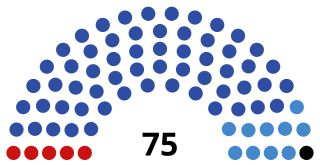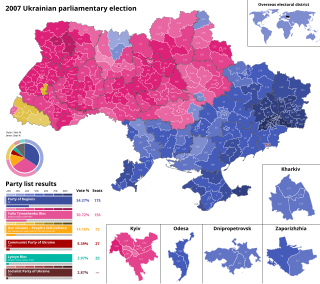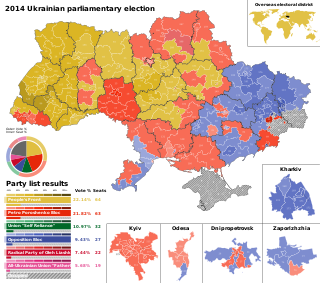This article presents the historical development and role of political parties in Ukrainian politics, and outlines more extensively the significant modern political parties since Ukraine gained independence in 1991.

The Our Ukraine–People's Self-Defense Bloc was an electoral alliance active in Ukraine from 2001 until 2012, associated with former President Viktor Yushchenko. Since 2005, the bloc had been dominated by a core consisting of the People's Union "Our Ukraine" party and five smaller partner parties. On 17 November 2011, the Ukrainian Parliament approved an election law that banned the participation of blocs of political parties in parliamentary elections. Since then several members of the Bloc have since merged with other parties.

The Socialist Party of Ukraine was a social democratic and democratic socialist political party in Ukraine. It was one of the oldest parties in Ukraine and was created by former members of the Soviet-era Communist Party of Ukraine in late 1991, when the Communist Party was banned. The party was represented in the Verkhovna Rada, Ukraine's parliament, from 1994 to 2007 and was the third and fourth largest party during that period. From 2007 onwards the party's electoral results became increasingly marginal, failing to win any seats in subsequent elections despite historically strong support in the central regions of the country. Oleksandr Moroz had led the party for more than twenty years before his resignation in 2012.

The Yulia Tymoshenko Bloc was the name of the bloc of political parties in Ukraine led by Yulia Tymoshenko since 2001. In November 2011, the participation of blocs of political parties in parliamentary elections was banned. The core party of the alliance, Batkivshchyna, remained a major force in Ukrainian politics.

The Party of Regions is a banned pro-Russian political party in Ukraine formed in late 1997 that became the largest party in Ukraine between 2006 and 2014.

The People's Movement of Ukraine is a Ukrainian political party and the first opposition party in Soviet Ukraine. Often it is simply referred to as the Movement. The party under the name Rukh was an observer member of the European People's Party (EPP) until 2013. It is considered to have played a key role in Ukraine regaining its independence in 1991.

Parliamentary elections were held in Ukraine on 26 March 2006. Election campaigning officially began on 7 July 2005. Between November 26 and 31 December 2005 party lists of candidates were formed.

Parliamentary elections were held in Ukraine on 31 March 2002. The Our Ukraine bloc emerged as the largest faction in the Verkhovna Rada, winning 113 of the 450 seats.

The Christian Democratic Union is a political party in Ukraine. On 2 December 2002, in Athens, Greece the party became a member of Centrist Democrat International. It is negotiated now its associated membership in the European People's Party. The party also publishes a newspaper called Християнський демократ.
The Lytvyn Bloc, formerly Lytvyn's People's Bloc, was a centrist political alliance in Ukraine from 2006 till 2012 led by Volodymyr Lytvyn. It is one of successors of the previous political alliance For United Ukraine which fell apart after Party of Regions left it. In 2007, the bloc surprisingly managed to return to parliament as a union of the People's Party and the Labour Party. According to Lytvyn the party had 400,000 members in October 2009.

The Opposition Bloc "Ne Tak", is a former pro-Russian political alliance in Ukraine. One of the leaders of the alliance was Viktor Medvedchuk.

The State Council of Crimea is the parliament of the Russia-administered Republic of Crimea. It claims to be a continuation of the 'Supreme Council of Crimea' following a vote by the Ukrainian parliament to dissolve the Supreme Council of Crimea. The Parliament is housed in the Parliament building in the centre of Simferopol.

Early parliamentary elections were held in Ukraine on 30 September 2007. The election date was determined following agreement between the President Viktor Yushchenko, the Prime Minister Viktor Yanukovych and the Chairman of the Verkhovna Rada Oleksandr Moroz on 27 May 2007, in an attempt to resolve the political crisis in Ukraine triggered by the 2 April 2007 presidential decree on dissolution of Ukraine's parliament.

The Party "Soyuz" is a pro-Russian political party in Ukraine that was mostly based in Crimea until 2014. It was registered in June 1997 under a registration number 867.

Supreme Soviet elections were held in the Ukrainian SSR on 4 March 1990, with runoffs in some seats held between 10 and 18 March. The elections were held to elect deputies to the republic's parliament, the Verkhovna Rada. Simultaneously, elections of oblast councils also took place in their respective administrative divisions.
The 2010 Crimean parliamentary election was held on 31 October 2010 as a part of the general 2010 Ukrainian local elections. Unlike the previous election to the Verkhovna Rada of Crimea, they were conducted on the mixed member proportional representation system. In order to gain representation in the Parliament of the Autonomous Republic of Crimea, a party or bloc had to garner at least 3 percent of the total vote. The Party of Regions won the elections with an overwhelming majority.
Party of Economic Revival was a political party in Ukraine set up by former communists in Crimea in November 1992 as Party of Economic Revival of Crimea. It was suspected of having ties with organized crime. The party was dissolved by the Ukrainian Ministry of Justice in 2003.

Snap parliamentary elections were held in Ukraine on 26 October 2014 to elect members of the Verkhovna Rada. President Petro Poroshenko had pressed for early parliamentary elections since his victory in the presidential elections in May. The July breakup of the ruling coalition gave him the right to dissolve the parliament, so on 25 August 2014 he announced the early election.

The Verkhovna Rada of Ukraine of the 8th convocation was a convocation of the legislative branch of the Verkhovna Rada, Ukraine's unicameral parliament. The 8th convocation met at the Verkhovna Rada building in Kyiv, having begun its term on 27 November 2014 following the last session of the 7th Verkhovna Rada. Its five-year term came to an end on July 24, 2019, marking the end of its tenth session.














